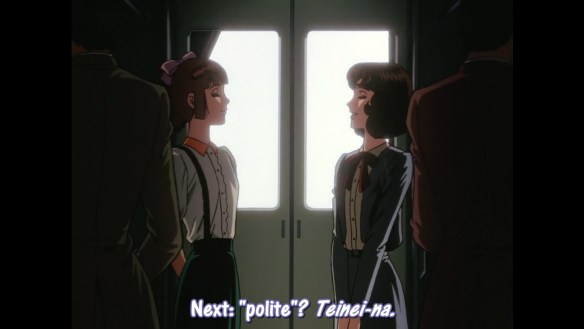Hello folks, and welcome back to Wrong Every Time. Today it is time once again to iron our uniforms and dry our tears, as we return to Seiren Academy for a fresh episode of Dear Brother. In the wake of Shinobu’s harrowing birthday party, our last episode saw the poor girl embarking on some kind of friendship hunger strike, hoping to regain Nanako’s affection or literally die trying. But after a stern lecture from Kaoru regarding the value of her health, as well as a visit from Nanako to her hospital bedside, it seems like Shinobu may well be at peace for the first time in her melodramatic existence.
This is certainly great news for Nanako, who has worries enough without a self-destructive stalker haunting her steps. Instead, we now have the girl who once memorably called Nanako’s bully a “child of a rat-dog” back on her side, ready to escalate basically any confrontation into a manic spectacle. Dear Brother strikes at real anxieties regarding adolescence and our roles in society, but it does so with a melodramatic flare that can always benefit from Shinobu’s exceedingly bad ideas, and perpetual willingness to embody the “my friend got mad at me, so now I am going to starve” intensity of teen emotions. Thank you Ikeda, thank you Dezaki, and thank you readers for joining me on this delightfully histrionic adventure. Let’s get to it!
Episode 11
We open on a bright sunny morning, as Nanako and Tomoko practice english vocab on the train. An opening that implies both a return to normal (the two friends at peace, actually focusing on their studies) and constancy (that regular train ride, a fragment of stability in an uncertain world)
Nanako tells Tomoko that Shinobu will be back in school today, implying some time has passed since the last episode, and also that Nanako has been keeping up her regular visits. Can Shinobu just be a Normal Friend at last? I really can’t imagine it
Tomoko is understandably hesitant to commit to a lunch date with Shinobu
Hahaha, oh Nanako. She reflects that the Shinobu situation was “partly her fault,” and that she’d furthermore rather not think about the bad things, and instead focus on the upcoming midterms. Internalizing guilt for someone else’s behavior and then repressing the nightmares altogether – an extremely Dear Brother approach to emotional distress
Outside the gates, Miya-sama stops to offer Saint-Just a rare book, a Jean Saint-Teauille first edition. It seems like Miya-sama is carefully managing Saint-Just’s affections, keeping her at just such a length that she continues to believe Miya-sama will favor her, and thus continues to fall victim to Miya-sama’s cruelties
“You’d prefer I weren’t so… changeable?” Yep, Miya-sama immediately turns this into a power play, essentially asserting that Saint-Just doesn’t deserve her gifts if she can’t also accept her fickle feelings. Everything is about domination for Miya-sama; it seems like she selects the best and brightest students simply because it’s all the more pleasurable to see them brought low
“Under the Elm Tree”
Ooh, love this establishing view out across the ocean. The glittering effect of the sea foam is dazzling; I wonder if that’s a similar tinfoil-inspired effect to the rays of sunlight, or perhaps created through light being fed through a porous membrane of some kind
The cult-like extent of Miya-sama’s power is further emphasized in the next scene, as she calls the sorority members to gather in the house in order to collectively study for midterms. A sequence of shots captures their march from the perspective of the other students, the sorority members appearing as hypnotized dolls moving two by two. The stained glass windows are particularly effective here, first presenting the girls as dehumanized silhouettes, and then lighting up their eyes so they appear glassy and dull as they pass by
You can easily see how the sorority is a self-perpetuating system. It’s all a glamorous facade from the outside, and once you’re in, you’re expected to even do such mundane activities as studying under its auspices, ensuring your whole social life is caught up in attending to the sorority’s needs
“Our rules require you to place in the top 50”
The senior members teach the juniors, further solidifying their internal society and process of succession, emphasizing the power you yourself can gain by serving under Miya-sama
It’s a funny quirk of this sort of “all-powerful student council” drama that tyrants can apparently set up an ironclad rule within their first two years of high school, lord over their subjects for like nine months, and then go off to study geology or whatever
Miya-sama invites them to her house, just as clouds arrive to blot out the sun. I’m sure that doesn’t mean anything
Miya-sama fucking towers over Shinobu as she chides her for getting hospitalized, saying good health is another requirement for the sorority. That’ll teach you to have a mental health episode, Shinobu
“It was so beautiful this morning.” Miya-sama underlines our subtext so far, remarking on the swift change from the carefree train ride to these dark clouds (a nice echo of her “changeable” line from earlier). And yet she smiles as she looks at the storm, a postcard memory revealing that she actually welcomes the darkness. No surprise there
Miya-sama then reveals that her gift to Saint-Just was indeed transactional, as she requests Saint-Just join their sorority session at her house. Fun trick with partitioned screens here, as the camera zooms in on each of them to a different degree in order to convey their relative power in the discussion
“Wait for me at five o’clock under the elm tree in the courtyard.” Miya-sama appears to be setting Saint-Just up for another tragic fall
They’ve got a whole damn caravan of cars waiting to take them to Miya-sama’s place
“Perhaps I was feeling a premonition of the unforgettable event that was about to take place.” I quite like how this production evokes a sense of fated encounters or rituals; there is a sense of inevitability in the tragedy of the academy’s three stars, and that trickles down to make characters like Nanako seem powerless to stop what’s unfolding. It’s like they’re all performing a dance that’s been set out long before, helpless to stop themselves
The rain begins to fall as Saint-Just waits beneath the elm tree for a rendezvous that will never occur. Fantastic composition with half of her face bathed in shadow, then struck through by a raindrop, framed like a tear falling from her obscured eye
Miya-sama clearly reveling in the simultaneous power she holds over Saint-Just and the underclassmen, as she orders Nanako to continue reading
Nanako realizes she forgot her French textbook, giving her an easy reason to go back to school and witness Saint-Just
“Be careful, the rain is particularly cold during this season.” Miya-sama, why are you like this
The other sorority girls gossip over Miya-sama’s favoritism. It is certainly worthy of note – does Miya-sama only favor Nanako because the other stars care for her, or is there some deeper reason?
Meanwhile, Miya-sama’s in such a good mood she decides to play Saint-Just’s favorite song
After an hour accidentally napping in the classroom, Nanako finds Saint-Just still waiting beneath the elm tree, making that dead-eyed “it’s laced with drugs” face from Devilman. Things are not going well
Saint-Just of course falls directly into Nanako’s arms. She can’t help become the guardian of these stars, just as they are fated to destroy each other
Upon waking in a moving taxi, she opens the door and attempts to walk back through traffic. Goddamnit Saint-Just, Nanako is trying her best here
Excellent focus on sound design throughout this sequence, with the pouring rain and frequently roar of horns creating a strong atmosphere in spite of the relatively still frames
Saint-Just attempts to ward Nanako away with a gift of sweet pea flowers, saying “take these and forget about me.” I presume this exchange echoes some formative event for Saint-Just, presumably an exchange between herself and Miya-sama
Their passage over a train-crossing bridge emphasizes the closeness of death, as terrible engines wail beneath them
And then the implied threat is nearly fulfilled, as Nanako pulls Saint-Just back from jumping over the railing. The bouquet, the intended symbol of Nanako’s escape from Saint-Just, is instead all that falls. Nanako cannot escape this path
When they finally reach Saint-Just’s apartment, Nanako discovers it is a demented hall of mirrors and sadness. Well, I suppose we all had that one friend in high school
And Done
Oh Nanako, how do you keep finding yourself in these situations? Well, at least as far as this episode’s concerned, the answer seems to be “so it is fated” – Miya-sama is destined to entice Saint-Just, Saint-Just is destined to destroy herself, and Nanako stands in the middle, mediating and sharing the burden of the similarly suspended Kaoru-no-Kimi. There is an entrancing sense of inevitability to this show’s relentless tragedy, with the mythic confidence of Ikeda’s plotting and grace of Dezaki’s adaptation making it feel not like these were choices made intentionally, but fated collisions of gods and demons. There are few shows that make the melodramatic interiority of high school so tangible to an observer, and fewer still that have so much fun with the delicious tragedy of it all. Oh god, I’m starting to understand Miya-sama, the show’s infected me too!
This article was made possible by reader support. Thank you all for all that you do.




